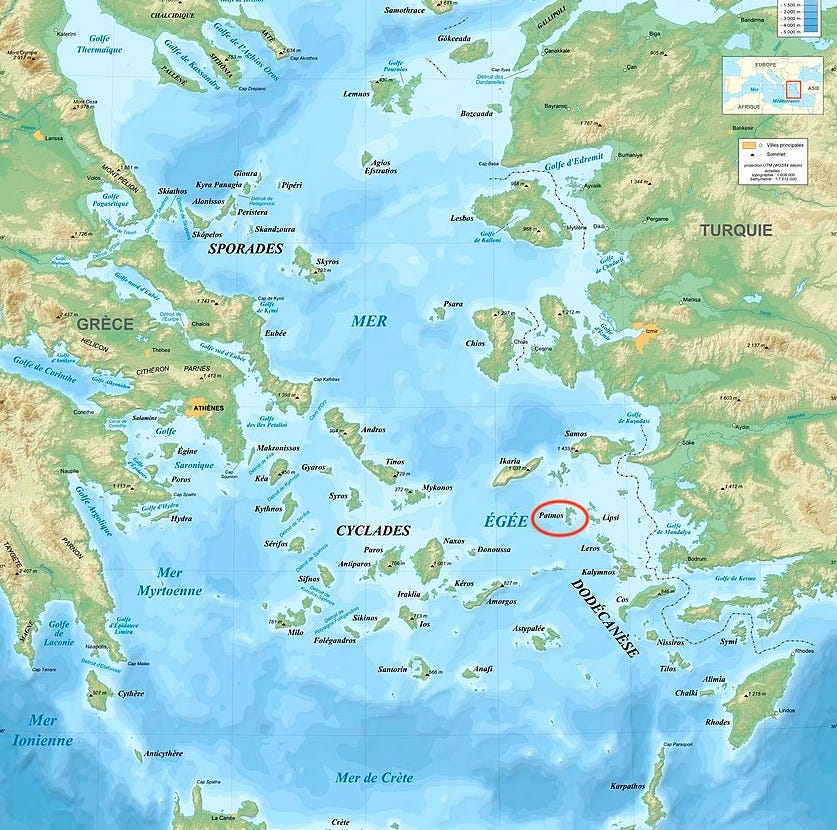I John—your brother and fellow sharer in the tribulation and kingdom and endurance in Jesus—was on the island called Patmos because of the Word of God and the witness of Jesus. Revelation 1:9
Here we go.
The introduction to Revelation is done!
Now we plunge into the main section of the book.
How does it start?
Like many good pieces of writing, John started with a setting and an event, a place and a happening, that immediately drew the hearers of Revelation into the story right alongside him.
John wanted us to experience his experience with him.
For this post, I will focus on the setting, both physical and circumstantial.
The Setting: Circumstances
The physical setting was Patmos, but I will address Patmos in a minute.
John did not just say, “I John was on Patmos.”
He began by giving information about his circumstances.
His first readers already knew why John was on Patmos, but from our perspective 2000 years later his cryptic words beg for more explanation.
And in fact ancient legends and modern interpretations about John on Patmos—why he was there, what happened to him while he was there, and how he received and recorded his visions—are many and all over the place.
The standard line is that John was exiled to Patmos for his witness to Jesus, usually set in the reign of Domitian in the 90s, but maybe Nero in the 60s, and when his exile was over he returned to Ephesus where he lived out his days writing the Gospel of John, the letters, and Revelation, then died sometime between AD 98 and 117 during the reign of the Roman emperor Trajan and was buried in Ephesus.
In the early 200s AD, Tertullien, a Christian from Carthage, related a tradition that John had been thrown into a vat of hot oil in Rome, but survived and was exiled to Patmos.*
The traditions are just that—traditions. Although there may be some or much truth in them, most of them are so removed in time and location that relying on them is a sketchy proposition—the hard evidence is just not there.
So I want to stick as closely to what Revelation and the rest of the New Testament (or contemporaneous sources, if any) might tell us about John and his situation.
I will simply look at the text and give its plain sense, the possible interpretations, and my conclusions.
I leave it to you to weigh what I say in light of your own prayerful study (and I welcome comments!). (continued)
In Plain Sight is a subscriber supported publication. If you appreciate the content and insights of this Substack, please consider a paid subscription. Subscribers receive additional material at the end of most posts with more subscriber only material to come.
“I, John …”
This was the third time John gave his name in Revelation.
The first time was to identify himself as the recipient of Revelation and an eye-witness to Jesus (1:1-2).
The second time was to state himself as the official writer of the letter (1:4).
This third time marked John as the seer who experienced the visions and prophetic words at a particular time and place (1:9-10).
What did John now say about himself?
He did not refer to himself as an apostle, but as “your brother and fellow sharer in the tribulation and kingdom and endurance in Jesus.”
John has turned from the past past (eye-witness to Jesus—1:2) to the recent past as part of the community of churches in Asia.
… your brother …
John first called himself “your brother.”
“Brothers” referred to Christian believers, men and women, and was how John normally referred to them in 1 and 3 John (and as Paul also did in his letters, Luke in Acts, and James, Peter, and the author of Hebrews in their respective letters).
In 1 John he used the term “beloved,” a similar but more endearing term that early Christians used for one another.
In using “brother,” John implied his own equal and humble standing with all who placed their trust in Jesus, despite his evident authority as eye-witness and recipient of Revelation (similar to 1:1 where he referred to himself as “slave” of God).
John claimed to be nothing more than the conduit for Revelation to his fellow believers.
… and fellow sharer …
More interesting is the next phrase: “and fellow sharer in the tribulation and kingdom and endurance in Jesus.”
That is a mouthful and full of questions.
By “fellow sharers” (Greek: synkoinōnos) John effectively repeated “your brother” but with a word that communicated the sense of “everything that has happened to me has happened to you and vice versa.”
In short, they were participants with John in what he was going through, maybe not in the same location, but the same suffering.
… in the tribulation and kingdom and endurance …
What did they share?
They participated together “in” a complex of related realities that John described as “the tribulation and kingdom and endurance in Jesus.”
But what did John mean?
John considered himself and his readers as experiencing “the tribulation” that Jesus spoke of three decades earlier (if John is on Patmos in the 60s), and that “(the) kingdom” and “(the) endurance in Jesus” were related to the tribulation.
There are two other passages in the New Testament with this complex of words together to support my claim.
First, here are Jesus’s words from Matthew 24:9–14:
And they will betray you to tribulation and they will kill you and you will be hated by all the nations for my name. And then many will be scandalized and will betray one another and will hate one another. And many false prophets will arise and deceive many, and because lawlessness multiplies, the love of many will grow cold. But the one who endures to the end will be saved. And this gospel of the kingdom will be preached to the whole inhabited world as a testimony to all the nations and then the end will come.
In this passage we have the distinct combination of tribulation, kingdom, endurance, and my name (= “in Jesus”).
Second, Paul—in the expectation of Jesus’s return—used the same complex of terms in 2 Thessalonians 1:4–8:
… so that we ourselves boast about you among the churches of God for your endurance and faithfulness in all the persecutions and the tribulations which you endure, an indication of the just judgment of God so that you might be considered worthy of the kingdom of God, for which you are suffering …
Why would John believe that the church was already in the tribulation?
Just briefly, John’s brother James had been put to death in AD 44, James the brother of Jesus had been stoned to death with other believers in AD 62, turmoil had erupted between the Jews and Romans in Palestine, Peter (by crucifixion) and Paul (by beheading) had been recently executed in Rome, Christians in Rome had been scapegoated by Nero who had arrested, crucified, and set their bodies on fire as street torches.
John himself (as the tradition goes) may have been thrown into hot oil or some other persecution but survived. The messages to come in Revelation 2–3 suggest the persecution of Christians in Asia for their faith and at least one execution.
So when John believed that the tribulation Jesus spoke of was in progress, he had very good reason.
And I might add that Peter and Paul had the same understanding.
I could set out more evidence for John’s understanding of being in the tribulation Jesus spoke of, but we’ll have plenty of opportunity to do so.
Of course, this early belief should at least give pause to those who would set “the great tribulation” only at the end of time—aka today.
The tribulation of Christian believers has been going on a long time.
Of the two terms with “tribulation”—“kingdom and endurance”—“endurance” goes naturally with tribulation, but “kingdom” seems strange.
Yet, when we understand that the vocation of the people of God is to be a “kingdom of priests to God and his Father” then John makes perfect sense.
When the loved and released-from-sin-by-his-blood people of God do their job in bringing the gospel (“the Word of God and the witness of Jesus”) to the world, resistance and hatred against God’s people will materialize from those caught in the world’s game (see my post, “Opting Out of the World's Game: Understanding Persecution for Jesus's Sake”).
Those who bring God’s kingdom are seen as enemies by those perfectly content with the kingdom of this world. (cont.)
Patmos
“I … was on the island called Patmos because of the Word of God and the witness of Jesus.”
The physical setting for John’s visions was a tiny island 38 miles off the southwest coast of Turkey called Patmos.
Today it is part of Greece.
Several (of the hundreds of) islands in the Aegean were places of Roman exile, so for John to be on one of them as an exile was not surprising.
Against the backdrop of tribulation, John went on the say that he was for the kingdom, or so it seems. “Because of the Word of God and the witness of Jesus” could imply missionary work: John could have been on Patmos to evangelize the people there.
But the remote and sparsely populated setting of Patmos makes that scenario highly unlikely.
More likely is the traditional view, a view supported not only by tradition, but by the occasional prophetic words in Revelation that called for his listeners to remain faithful in the midst of persecution.
“Because of the Word of God and the witness of Jesus” implies that John’s preaching (and writing) about Jesus brought him to the attention of the authorities, just like Peter and Paul before him, and they arrested and exiled him.
Did you notice that John repeated the phrase “the Word of God and the witness of Jesus” from 1:2?
As I said in my post “Who Wrote Revelation?” the Word of God referred to the incarnation and ministry of Jesus as emissary of the Father, and the witness (or testimony) of Jesus referred to Jesus’s death.
When John said “because of” he was connecting his “witness” in 1:2 with his presence on Patmos. (I could actually hypothesize that the phrase “the Word of God and the witness of Jesus” referred to the Gospel of John but that would be a stretch!)
John gave us no clue of how long he was on the island of Patmos.
Bu what we can surmise from his language is that he considered his presence there already in the past when he actually put Revelation to writing.
He said, “I was on Patmos.”
And in the next verse he said, “I was in a spiritual state on the Lord’s Day.”
John was in exile when he experienced the visions and prophetic oracles, but he composed the book of Revelation later, and perhaps over several years.
So the table is set (the setting that is).
In the next post I will take up John’s visionary encounter with God on Patmos.
*Tertullien, Against the Heretics, ch. 36. A comprehensive (meaning highly dense) compilation of the traditions about John are collected and commented on by Alan Culpepper, John, the Son of Zebedee, the Life of a Legend. The Wikipedia article on John the Apostle gives the basics and the debates involved, but little help finding the traditions.
Observations on the Greek Text of Revelation
and Audio podcast
Ἐγὼ Ἰωάννης, ὁ ἀδελφὸς ὑμῶν καὶ συγκοινωνὸς ἐν τῇ θλίψει καὶ βασιλείᾳ καὶ ὑπομονῇ ἐν Ἰησοῦ, ἐγενόμην ἐν τῇ νήσῳ τῇ καλουμένῃ Πάτμῳ διὰ τὸν λόγον τοῦ θεοῦ καὶ τὴν μαρτυρίαν Ἰησοῦ. Revelation 1:9
1. Ἐγὼ Ἰωάννης … ἐγενόμην …
Greek sentences normally follow the order of Verb (V) then Subject (S—either a pronominal suffix on the verb or specifically present), then Object (O—if present)—abbreviated VSO.
Keep reading with a 7-day free trial
Subscribe to In Plain Sight to keep reading this post and get 7 days of free access to the full post archives.






